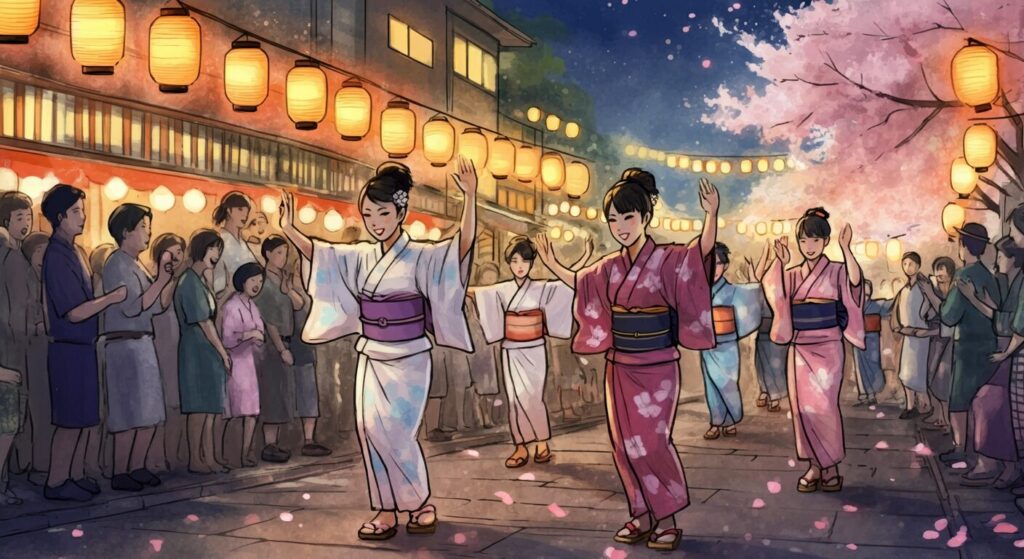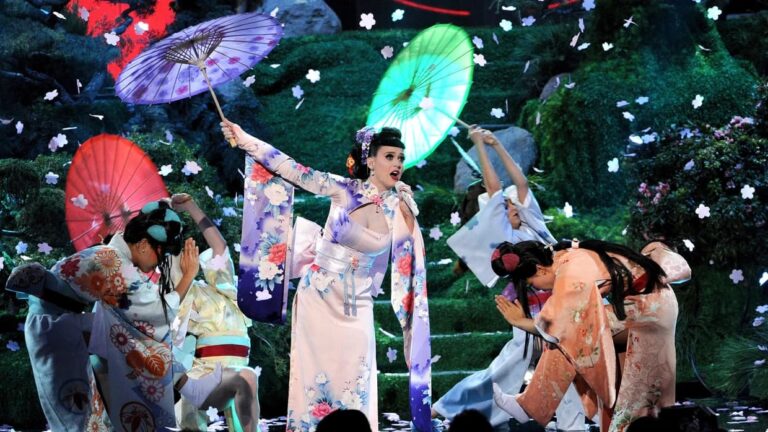2024-11-28 Story Dice: Travel Adventures!
Cultural Mix-up Story
Story Dice Used
- Light bulb → festival lantern
- Hand → traditional dance gesture
- Question mark → misunderstanding
- Footprints → parade route
- Globe → international festival
Synopsis
“I was taking photos of beautiful lanterns (light bulb) when someone grabbed my hand (hand). I didn’t understand (question mark) what was happening, but suddenly I was walking (footprints) in a parade! It was part of an international festival (globe), and I had accidentally×「accidentally」は「偶然に、うっかりと」という意味の副詞です。
文法説明:
予期せずに何かが起こったことを表現します。
例文:
I accidentally walked into the wrong room.
私は間違えて違う部屋に入ってしまいました。 joined the dancers!”

The Story: “The Festival Helper” (530 words)
I was admiring×「I was admiring」は「私は感心して見ていた」という意味です。
文法説明:
過去進行形で、ある時点で続いていた行動を表現します。
例文:
I was admiring the sunset when it started to rain.
私は夕日に見とれていたときに雨が降り始めました。 the paper lanterns (light bulb) at the summer festival in a small town near Nagano. They swayed×「sway」は「揺れる、揺らめく」という意味の動詞です。
例文:
The trees swayed in the wind.
木々が風に揺れていました。 gently×「gently」は「優しく、穏やかに」という意味の副詞です。
例文:
The mother gently rocked the baby to sleep.
母親は赤ちゃんを優しく揺らして寝かしつけました。 in the evening breeze×「breeze」は「そよ風、微風」という意味の名詞です。
例文:
A cool breeze blew through the open window.
涼しいそよ風が開いた窓から吹き込んできました。, casting warm light×「casting warm light」は「暖かい光を投げかける」という意味です。
文法説明:
「cast」(投げかける)の現在分詞が使われています。
例文:
The fireplace was casting warm light across the room.
暖炉が部屋中に暖かな光を投げかけていました。 across the street. I was trying to capture their glow×「glow」は「柔らかい光、明かり」という意味の名詞です。
例文:
The candles cast a soft glow in the room.
ろうそくは部屋に柔らかな明かりを投げかけていました。 with my camera when everything changed.
A woman in a beautiful yukata suddenly grabbed my hand. Before I could react×「react」は「反応する、対応する」という意味の動詞です。
例文:
He didn't have time to react to the sudden change.
彼は突然の変化に反応する時間がありませんでした。, she was demonstrating×「demonstrate」は「実演する、見せる」という意味の動詞です。
例文:
The teacher demonstrated how to solve the problem.
先生は問題の解き方を実演しました。 a dance move, her hands flowing like water. Other dancers around us were making the same graceful×「graceful」は「優雅な、優美な」という意味の形容詞です。
例文:
The ballet dancer made graceful movements across the stage.
バレエダンサーは舞台上で優雅な動きをしていました。 gestures (hand), but I stood frozen×「stand frozen」は「立ち尽くす、凍りついたように立つ」という意味の表現です。
文法説明:
「frozen」は「凍りついた」という意味で、動けない状態を表します。
例文:
She stood frozen with surprise.
彼女は驚きで立ち尽くしました。, completely confused×「confused」は「混乱した、困惑した」という意味の形容詞です。
例文:
The students looked confused by the difficult question.
学生たちは難しい質問に困惑した様子でした。 (question mark) about what was happening.
“Matsuri! Dance!” she said in English, still holding my hand. I tried to explain that I was just a tourist, but she was already pulling me into line with other dancers. Looking down, I saw our footprints forming in the dust×「dust」は「ほこり、土埃」という意味の名詞です。
例文:
The wind blew dust into our eyes.
風がほこりを私たちの目に吹き込みました。 of the street – hers precise×「precise」は「正確な、的確な」という意味の形容詞です。
例文:
The dancer's movements were precise and beautiful.
そのダンサーの動きは正確で美しかったです。 and graceful, mine awkward×「awkward」は「ぎこちない、不器用な」という意味の形容詞です。
例文:
He made awkward movements as he tried to dance.
彼はダンスを踊ろうとしてぎこちない動きをしました。 and hesitant×「hesitant」は「躊躇する、ためらいがちな」という意味の形容詞です。
例文:
She took hesitant steps towards the stage.
彼女はためらいがちに舞台に向かって歩き出しました。.
It turned out×「It turned out」は「結果として〜とわかった」という意味の表現です。
文法説明:
予想や期待と異なる結果を説明する際に使われます。
例文:
It turned out that he was right all along.
結局、彼が最初から正しかったとわかりました。 I had wandered into×「wander into」は「ふらっと入る、迷い込む」という意味の句動詞です。
文法説明:
意図せずに場所に入ることを表現します。
例文:
We wandered into a beautiful garden by accident.
私たちは偶然美しい庭に迷い込みました。 the preparation for the town’s famous International Dance Festival (globe). The woman, Sakura-san, was a dance instructor who had studied traditional dances from around the world. She had mistaken me for×「mistake someone for」は「〜を〜と間違える」という意味の表現です。
文法説明:
「mistake A for B」の形で、AをBと勘違いすることを表します。
例文:
I mistook him for his twin brother.
私は彼を双子の兄弟と間違えました。 one of the registered participants, but when she realized her error, she insisted I stay anyway.
“Dance has no passport,” she said, her English simple but clear. “Everyone can speak dance.”
For the next hour, Sakura-san patiently taught me the basic moves of the traditional dance. Other participants – people from at least a dozen different countries – joined in. There was a university student from Thailand, a retired couple×「a retired couple」は「退職した夫婦」という意味です。
文法説明:
「retired」(退職した)が「couple」(夫婦)を修飾しています。
例文:
A retired couple moved into the house next door.
退職した夫婦が隣家に引っ越してきました。 from Australia, and even a professional dancer from Brazil. None of us spoke the same language fluently×「fluently」は「流暢に、スラスラと」という意味の副詞です。
例文:
She speaks three languages fluently.
彼女は3つの言語を流暢に話します。, but we all learned to move to the same rhythm×「rhythm」は「リズム、韻律」という意味の名詞です。
例文:
Everyone was dancing to the rhythm of the music.
みんな音楽のリズムに合わせて踊っていました。.
As the sun set and the lanterns grew brighter, we paraded through the streets. Children ran alongside us, throwing flower petals. Old women clapped from their doorways. Someone put a festival happi coat over my shoulders, and a young girl gave me a paper fan.
As the sun set and the lanterns grew brighter, we paraded through the streets. Children ran alongside us, throwing flower petals. Old women clapped from their doorways. Someone put a festival happi coat over my shoulders, and a young girl gave me a paper fan.
The parade route×「parade route」は「パレードのコース、行進経路」という意味です。
文法説明:
「parade」(パレード)が「route」(経路)を修飾する複合名詞です。
例文:
The parade route goes through the city center.
パレードのコースは市街地を通ります。 took us through the old part of town, past temples and traditional houses. At each corner, more people joined in. I learned parts of the dance from watching a grandmother in front of me, the steps from a young boy beside me, and the hand movements from Sakura-san’s patient demonstrations.
At the end of the night, during the festival dinner, Sakura-san explained that the dance tells the story of friendship between different cultures. Each gesture has meaning: welcoming strangers, sharing joy, and celebrating together. She invited me to join her dance group, which meets every weekend to practice traditional dances from around the world.
Now, whenever I see those paper lanterns in my photos, I remember how a simple misunderstanding×「a simple misunderstanding」は「単純な誤解、ちょっとした勘違い」という意味です。
文法説明:
「simple」(単純な)が「misunderstanding」(誤解)を修飾しています。
例文:
A simple misunderstanding led to an unexpected adventure.
ちょっとした誤解が予想外の冒険につながりました。 led to an evening of international friendship. I still attend Sakura-san’s dance classes, where I’m learning not just about dance, but about how movement can bridge any cultural gap×「bridge any cultural gap」は「文化の隔たりを埋める」という意味の表現です。
文法説明:
「bridge」(橋渡しする)が「cultural gap」(文化の隔たり)に対して行われる動作を表します。
例文:
Music can bridge any cultural gap between people.
音楽はあらゆる人々の間の文化的な隔たりを埋めることができます。.








A Little Boy’s Travel Adventure
Theme: During Transit
5 dice: 1. Ropeway, 2.Bud, Sprout, 3.Feather, 4.Hand, 5.Quote Bubble
A little boy (‘little boy’ = ‘sprout’) started for his first travel abroad to Switzerland by himself.
The original plan was to fly (‘fly’ = ‘feather’) from Japan to Switzerland, and then change to local transportation such as mountain trains.
But the airplane (‘airplane’ = ‘feather’) got delayed, and he could not catch the trains. He felt he was in trouble and asked someone nearby for help (‘ask for help’ = ‘hand’).
Then a kind person gave him a good advice (‘a kind person’s advice’ = ‘quote bubble’) to use other train lines and ropeway (‘ropeway’ = ‘ropeway’) to get to the top of the Matterhorn.
On the way to the top of the mountain, he could see beautiful scenery of mountains and glacier, and many kind of mountain plants sprout out (‘mountain plants sprout out’ = ‘sprout’).
At the top of mountain, he cried, ”I did it!” (”I did it!” = ‘quote bubble’)
He finally achieved his hope and felt satisfied and happy. Then, his first trip to abroad ended successfully.
135 words excluding annotations